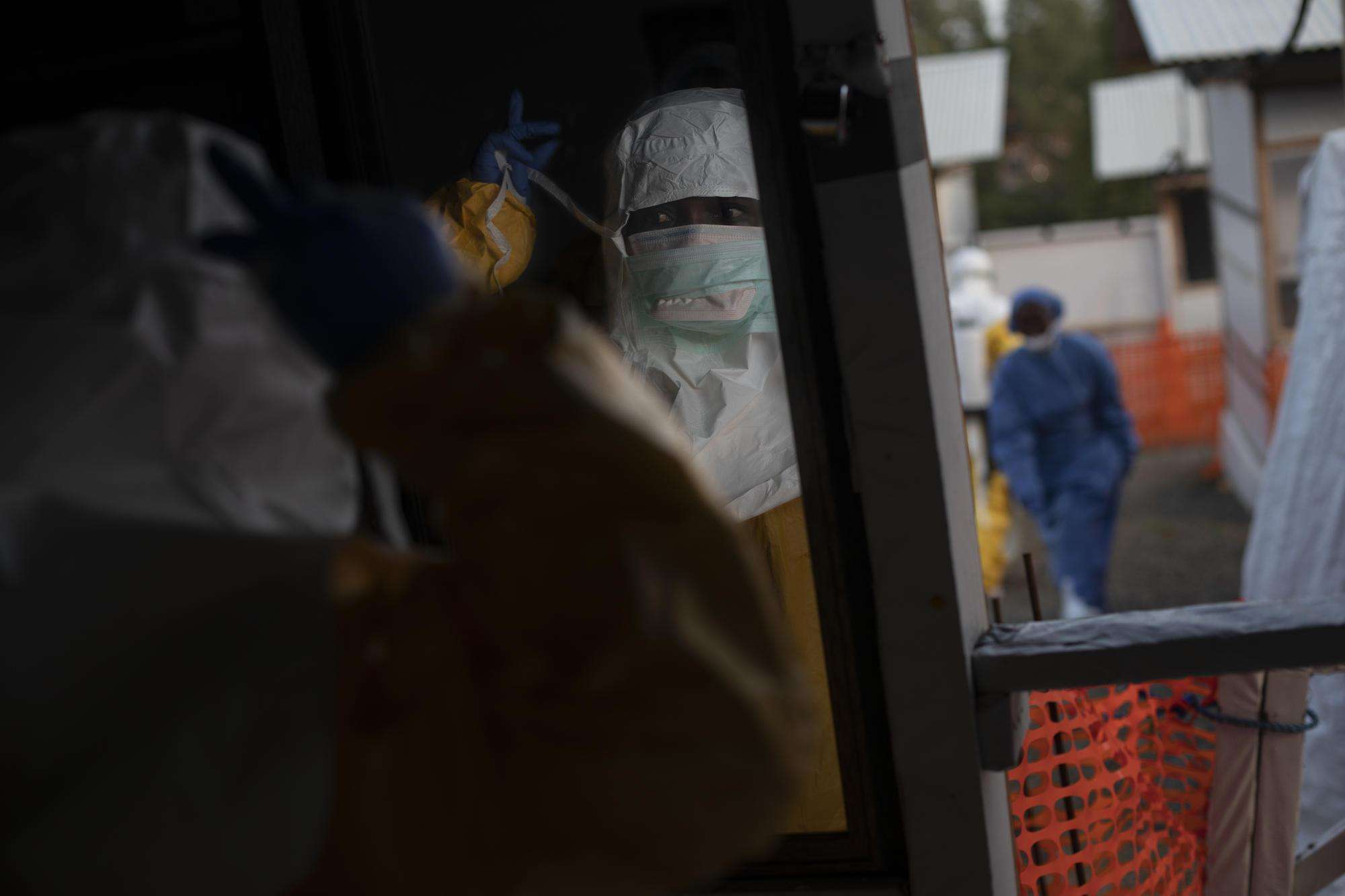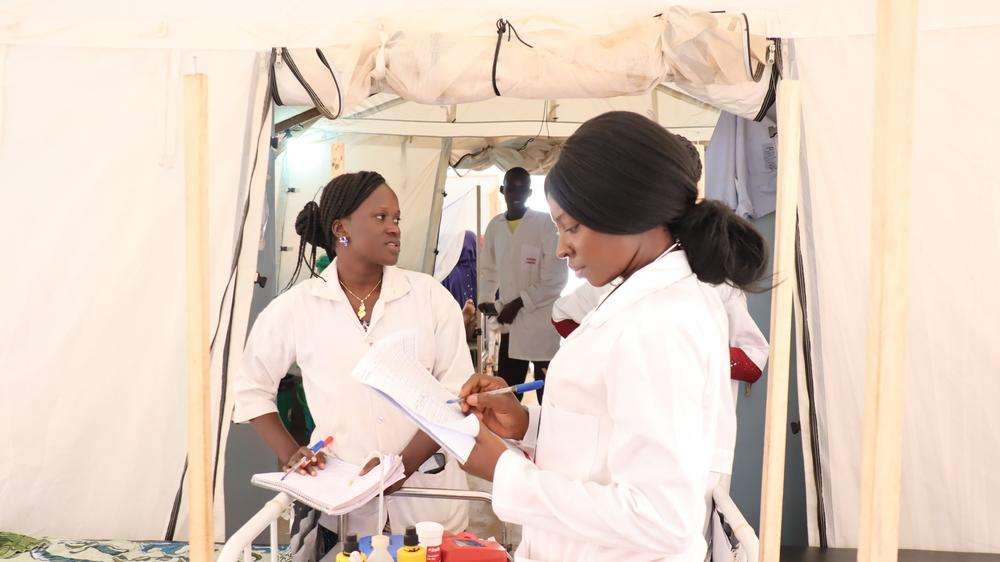The current Ebola epidemic in Democratic Republic of Congo (DRC) is the worst on record in the country and the second-largest outbreak recorded anywhere. As of July 17, more than 1,705 people have died from the viral disease.
Almost a year after the declaration of the outbreak—which is affecting North Kivu and Ituri provinces—the epidemic is still not under control. On July 17, the World Health Organization declared the Ebola outbreak in DRC to be a public health emergency of international concern. MSF hopes greater international attention will improve the response to the epidemic and lead to a revised strategy that is more patient-focused and community-centered.
|
Ebola situation report as of July 28, 2019 Total cases: 2,671 cases Total deaths: 1,790 *Data published by DRC Ministry of Health. "Probable" deaths refer to deaths that were linked to confirmed Ebola cases but not tested before burial. |
This is DRC’s tenth outbreak of Ebola in 40 years. The Ministry of Health (MoH) officially declared the latest outbreak of Ebola virus disease in North Kivu on August 1, but the outbreak likely began months earlier. In the first eight months (from August 2018 to March 2019) more than 1,000 confirmed and probable cases were reported in the affected region. However, from April to June 2019, that number doubled, with an additional 1,000 new cases of Ebola reported in this short period alone. Since early June, the number of cases per week has remained high, averaging between 75 and 100.
Isolated cases were also reported in Uganda this summer, and one case was confirmed last week in Goma, a city of 2 million people located on the Rwandan border.
Ebola response
Doctors Without Borders/Médecins Sans Frontières (MSF) remains an active player in the Ebola response. We withdrew from our Ebola treatment centers (ETCs) in the North Kivu cities of Butembo and Katwa—in the epicenter of the outbreak—following separate attacks on the facilities earlier this year. However, we are currently supporting an MoH ETC in Goma Provincial Hospital, finalizing the construction of our own ETC in Goma, and managing an ETC in Bunia. MSF has been present in Goma for Ebola preparedness for more than seven months now, reinforcing the disease surveillance system and ensuring there is adequate capacity to manage suspected and confirmed cases.
We are helping existing health care structures in North Kivu and Ituri provinces to prepare for and handle potential Ebola cases and managing transit centers where patients with suspected Ebola are tested and sent to ETCs if they test positive.
Additionally, MSF is working to implement and strengthen disease surveillance and infection prevention and control activities (IPC) in the region, as well as working with local health structures to make sure they have the capacity and equipment to isolate possible positive cases.
In any Ebola context, our main priority is to work closely with communities to identify their needs and ensure that access to essential health care services are guaranteed for patients suffering from all major diseases affecting people in the area, such as malaria, diarrheal diseases, and other conditions. MSF is helping reinforce local health systems to improve capacity to respond to the various health needs. For example, we are currently responding to four simultaneous crises in Ituri province: an Ebola epidemic, a massive measles outbreak, the annual seasonal malaria peak, and forced displacement due to violence.
MSF also aims to integrate its Ebola response activities into the existing health care system to ensure such services are close to those who need them. Integrating testing for suspected cases into the health care structures that people know and trust could encourage them to promptly seek treatment in case of Ebola-like symptoms, thereby improving the acceptance of Ebola care and reducing the number of people dying at home.
As of July 2019, MSF has more than 530 staff deployed in DRC for the Ebola emergency and supports the MoH by providing financial incentives to 745 of its staff. We are currently running nine Ebola projects in North Kivu and Ituri provinces.
Local context
The epicenter of the outbreak is in North Kivu province, a densely populated area in northeastern DRC with approximately seven million people. Despite the challenges of rough terrain and poor roads, people in this region are highly mobile. North Kivu shares a border with Uganda to the east and sees a lot of trade, as well as human trafficking and “irregular” crossings. Some communities live on both sides of the border and cross back and forth frequently to visit relatives or trade goods.
North Kivu has been an area of conflict for more than 25 years, with more than 100 armed groups estimated to be active. Criminal activity, such as kidnapping, is relatively common, and skirmishes between armed groups occur regularly. Widespread violence has uprooted people and made some areas in the region quite difficult to access.
As of early July, 25 health zones out of a total 47 in the provinces of North Kivu and Ituri have been affected by Ebola. Twenty-two are considered active transmission zones, meaning that they have reported new confirmed cases in the last 21 days. Two new health zones in the affected region, Ariwara and Goma, were recently added to the list. While the number of new cases is decreasing in former hotspots such as Butembo, Katwa, and Mandima health zones, there has been an increase in new cases in Beni, and a steadily high incidence of new cases in Mabalako health zone.
Community engagement
All actors involved in the Ebola response, including MSF, have failed to build trust within the local community. Widespread mistrust, as well as violent attacks against the Ebola response, are hampering efforts to control the epidemic. People are not seeking care in Ebola Treatment Centers, resulting in an increased likelihood that the virus could spread in other health facilities that aren’t equipped with proper infection control procedures and equipment.
Targeted violence against those working on the Ebola response disrupt crucial activities like vaccination, contact tracing, community health promotion, and safe burials, in addition to discouraging people from coming to ETCs when they fall ill and present Ebola-like symptoms.
It will not be possible to end this outbreak if trust is not built between those involved in the Ebola response and the people affected. We have to listen to the needs of communities, restore their power of choice when it comes to managing their health, and involve them in every aspect of the response. As MSF, we do so by being present in local health structures, where we offer general health care services and work to increase access to health care for all patients, and by implementing Ebola-related activities such as managing transit units where people are tested for the disease and strengthening IPC activities in health facilities.
Epidemiological concerns
MSF is extremely concerned about the lack of visibility on the actual epidemiological situation. Many people have died of Ebola in their communities before they could be identified, diagnosed, and admitted for treatment of the disease. This high number of community deaths (reported at around 40 percent) is a strong indicator that the outbreak is certainly not under control.
Since the beginning of the epidemic, the delay between onset of symptoms and admission to hospital has remained unchanged, at around five days. The longer an Ebola patient stays in the community without proper isolation, the higher the risk that they will pass the virus to others.
Additionally, the fact that many new confirmed cases have not been identified and followed as contacts is highly worrisome. Since the beginning of the epidemic, only around half of the new reported Ebola cases have been identified as contacts of previous confirmed cases before falling ill and seeking treatment or dying without receiving proper Ebola care. These figures highlight the many challenges related to the identification and close follow-up with contacts of people infected with Ebola (both confirmed and probable), which would allow people who have the disease to receive adequate and timely care and reduce the risk of transmission by facilitating the vaccination of those contacts.
Vaccination strategy
As part of a larger consortium, MSF and Epicentre—our research arm—are active contributors to discussions around the vaccination strategy, including the possible introduction of a second investigational vaccine. MSF also expressed its willingness to participate in the implementation of a revised vaccination strategy, if this is decided.
We consider that the ring vaccination strategy implemented so far is not enough to contain the epidemic. The current strategy involves vaccinating anyone who’s been in contact with someone infected with Ebola, as well as all of that person’s contacts. This approach relies heavily on the identification and follow-up of contacts in a context where doing so is very challenging and the affected populations are moving around. We have to consider increasing the number of people receiving vaccination against Ebola in the current epidemic as an alternative strategy.
We agree with the experts’ recommendations of adopting a vaccination strategy that is based on geographic targeting and facilitating access to vaccination for more people, including all people who are at risk of contracting the virus.
The number of doses of rVSV-ZEBOV—the Ebola vaccine currently being used—available in DRC should be increased. Full transparency should be ensured with respect to the status of the global stock of the rVSV-ZEBOV vaccine, which is made by pharmaceutical corporation Merck.
We ask the authorities in DRC to reconsider the decision to refuse the trial of a second investigational Ebola vaccine in DRC for the duration of this epidemic.





